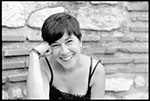Little Street for Sex
LITTLE STREET FOR SEX
I live in the shopping center of the world, it’s open 24 hours. There are, for example, streets for luminous bodies, and there’s no end to the lights, lace lampshades, chandeliers, bulbs of every breed; then a street of screws and nuts, and an endless line of fish restaurants, a side street where you can buy sheep heads and organs you’ll never see in the anatomy books. Not far is a black-and-red street with jazz clubs, then carpets, kilims, kilims, and all of them flying, alleys of baklava and lokum, shop windows dripping with meat and honey and it continues thus until your feet start hurting, and thoughts cease.
The street for sex is an unsightly descent, one of many that lead to the water and the docks with moored ships for the Bosphorus and Asia. On the left side of the street, bulk boxes gape with condoms. Men, mostly young, sit in groups, on walls and in stairways, smoke and talk, wait their turn. On the right side there are no windows, just a massive metal door, half open. Beyond, a little gatehouse can be seen: two cops ID and pat down the customers before they let them into the brothel.
Women don’t really pass by around here, except if they get lost, except for the two of us.
T. tells me: Don’t stare like a hayseed, and no, don’t take pictures, a cop could come out. And if you could see it the day after Ramadan, the line of men is longer than the street.
Why wouldn’t I stare, I say? They stare too.
I mention Flaubert, who spent a few weeks here, visited a brothel, right here in Galata. At the time he noticed—Flaubert wrote to his friend Bouilhet—seven sores on his penis, aiee! (The start of syphilis he contracted, probably, in Beirut, but that, sources say, didn’t really stop him from whoring. For more information, consult the slightly biting O. Pamuk’s Istanbul, V&R, pg. 313.)
On the way out, toward the Galata Bridge, where the Sea of Marmara collides with winds from the Black Sea, and countless men net sardines or some similar fish, we run into a line of covered Turkish teens and little ladies under hijabs: they carry banners and Palestinian flags. While we watch them, the eyes of fishermen sail over the naked back of some tourist girl who just now crosses the bridge.
![]()
MALA ULICA ZA SEKS
Živim u shopping centru svijeta, radi od 0 do 24. Postoje, na primjer, ulice za rasvjetna tijela, pa kad to krene nikad kraja svjetiljkama, čipkastim abažurima, lusterima, žaruljama svake fele; zatim ulica vijaka i matica, pa beskrajan niz ribljih restorana, jedan sokak gdje se mogu kupiti ovčje glave i iznutrice kakvih nema ni u anatomskim atlasima. Nedaleko je i crveno-crna ulica sa jazz klubovima, pa ćilimi, ćilimi, ćilimi, a svaki leti, aleje baklava i lokuma, izlozi po kojima curi meso i med i tako redom, dok ne zabole noge, a pamet stane.
Ulica za seks je neugledna nizbrdica, jedna od mnogih kojima se može spustiti do obale i dokova uz koje su privezani brodovi za Bospor i Aziju. S lijeve strane ulice otvorene su kutije prepune kondoma rinfuzo. Muškarci, uglavnom mlađi, sjede u grupicama, po zidovima i ulaznim stubištima, puše i ragovaraju, čekaju svoj red. S desne strane nema izloga, samo ogromna metalna vrata. Jedno krilo je otvoreno i vidi se kućica na kapiji: dva policajca legitimiraju i pregledavaju mušterije prije nego što ih puste u kupleraj.
Žene ovuda baš i ne prolaze, osim ako ne zalutaju i osim nas dvije.
T. mi kaže: Ne bulji tako ko seljanka i ne, nemoj ih fotografirati, mogao bi izaći policajac. E, da vidiš kako je dan nakon Ramazana, muški red je duži od ulice.
Što ne bih buljila, kažem, bulje i oni u nas.
Spominjem joj Flauberta koji je ovdje proveo nekoliko tjedana, pa posjetio i neki bordel, ma baš ovdje na Galati. A otkrio je tih dana — piše Flaubert svom prijatelju Bouilhetu — sedam ranica na penisu, ajme. (Početak sifilisa koi je zaradio, valjda, u Beirutu, ali to ga, navode izvori, nije osobito sprječavalo u kurbarluku. Za više informacija konzultirati pomalo zajedljivog O. Pamuka, “Istanbul”, V&R, str. 313)
Na izlazu, prema mostu Galata, gdje se sudaraju vjetorovi s Crnog i Mramornog mora, a mnoštvo ribara lovi srdele ili neku sličnu ribu, naletimo na kolonu pokrivenih turskih tinejdžerki i mnogih gospođa pod hidžabima: one nose transparente i palestinke zastave. Dok ih pratimo pogledom, oči ribara plove na golim leđima neke turistkinje koja upravo prelazi most.
Translator’s Note
Translation is a kind of role-playing. You go into it because the experience of temporarily ‘being’ someone else—in this case, another artist—is mentally stimulating. I think that as writers we need to get comfortable with shedding our skin, our identities, so that we can cultivate the ability to understand different perspectives, to refine authentic linguistic sensitivities, and to create emotionally true, no-nonsense work. Also, the process of translation feels nowhere near as solitary as writing one’s own work. But I approach both in a similar manner: with a pitcher of black coffee, some album on an endless repeat, and lots of time alone. I work for weeks at a time on batches of poems. “Little Street for Sex” is from Olja’s collection Mamasafari, a book at the heart of which is a series of poems about Istanbul. I translated the book, and this is one of my favorite poems in it.
Why Olja’s work? My inspiration comes from the fact that there is a lack of recorded narratives about our people (both Olja and I are Croatians), and about South Slavs in general—narratives that dive into both our primitivism and collective emotional scars. Also, except for Charles Simic’s The Horse Has Six Legs (an anthology of Serbian poetry), the literary talent of our linguistic region has not had much serious exposure to American readers. I am also interested in how individual identity gets expressed through one’s sexuality and as a part of a collective identity. And I gravitate toward those authors who are honest in that exploration but also whose use of language demonstrates a kind of brilliance, ambition, understated domination of it—those authors who break our expectations of literature, and then renew them. Olja does exactly that. Hers is an understated voice that carries immense strength. It’s like a whispered command. Also, her use of Croatian language is traced with dialect in a very individual manner. And I love that variety of sounds and flavors, and the challenge it creates in translation. Those dialectic shades of a language create a textual tension that often helps heighten that blood-thrashing we experience when reading a good poem.






